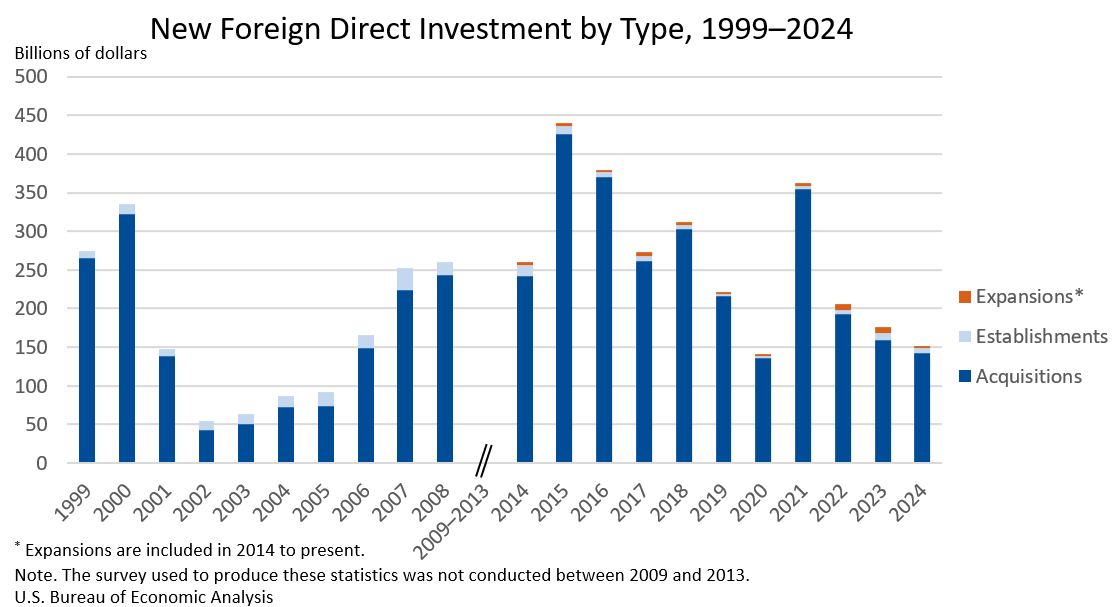Bureau of Economic Analysis
New Foreign Direct Investment in the United States, 2024
Expenditures by foreign direct investors to acquire, establish, or expand U.S. businesses totaled $151.0 billion in 2024, according to preliminary statistics released today by the U.S. Bureau of Economic Analysis. Expenditures decreased $24.9 billion, or 14.2 percent, from $176.0 billion (revised) in 2023 and were below the annual average of $277.2 billion for 2014–2023. As in previous years, acquisitions of existing U.S. businesses accounted for most of the expenditures.
Principal Federal Economic Indicators
Noteworthy
- 2025 News Release Schedule
- Innovation at BEA
- 2025 Annual Updates
- New! Services Trade Data for More Countries
- Data Tool: Trade in Value Added
- Distribution of State Personal Income
- Updated: RIMS II Regional Multipliers
- Arts and Culture
- Space Economy
- FDI Now in State BEARFACTS
- Quick Guide: Price Indexes
The Latest
Gross Domestic Product (Third Estimate), Corporate Profits, and GDP by Industry, Fourth Quarter and Year 2021
Real gross domestic product (GDP) increased at an annual rate of 6.9 percent in the fourth quarter of 2021, following an increase of 2.3 percent in the third quarter. The increase was revised down 0.1 percentage point from the "second" estimate released in February. The acceleration in the fourth quarter was led by an acceleration in inventory investment, upturns in exports and residential fixed investment and an acceleration in…
U.S. International Investment Position, Year 2021
The U.S. net international investment position, the difference between U.S. residents’ foreign financial assets and liabilities, was –$18.10 trillion at the end of 2021, according to statistics released today by the U.S. Bureau of Economic Analysis (BEA). Assets totaled $35.21 trillion, and liabilities were $53.31 trillion. At the end of 2020, the net investment position was –$14.01 trillion.
U.S. International Investment Position, Fourth Quarter 2021
The U.S. net international investment position, the difference between U.S. residents’ foreign financial assets and liabilities, was –$18.10 trillion at the end of the fourth quarter of 2021, according to statistics released today by the U.S. Bureau of Economic Analysis (BEA). Assets totaled $35.21 trillion, and liabilities were $53.31 trillion. At the end of the third quarter, the net investment position was –$16.35 trillion.
U.S. International Investment Position, Fourth Quarter and Year 2021
The U.S. net international investment position (IIP), the difference between U.S. residents’ foreign financial assets and liabilities, was –$18.10 trillion at the end of the fourth quarter of 2021, according to statistics released today by the U.S. Bureau of Economic Analysis (BEA). Assets totaled $35.21 trillion, and liabilities were $53.31 trillion. At the end of the third quarter, the net investment position was –$16.35 trillion.
U.S. Current-Account Deficit Widens in 2021
The U.S. current-account deficit, which reflects the combined balances on trade in goods and services and income flows between U.S. residents and residents of other countries, widened by $205.5 billion, or 33.4 percent, to $821.6 billion in 2021. The widening mostly reflected an expanded deficit on goods. The 2021 deficit was 3.6 percent of current-dollar gross domestic product, up from 2.9 percent in 2020.
U.S. Current-Account Deficit Narrows in Fourth Quarter 2021
The U.S. current-account deficit, which reflects the combined balances on trade in goods and services and income flows between U.S. residents and residents of other countries, narrowed by $2.0 billion, or 0.9 percent, to $217.9 billion in the fourth quarter of 2021. The narrowing reflected a reduced deficit on secondary income and expanded surpluses on services and on primary income that were mostly offset by an expanded deficit on goods. The…
U.S. International Transactions, Fourth Quarter and Year 2021
The U.S. current-account deficit narrowed by $2.0 billion, or 0.9 percent, to $217.9 billion in the fourth quarter of 2021, according to statistics released by the U.S. Bureau of Economic Analysis. The revised third-quarter deficit was $219.9 billion. The fourth-quarter deficit was 3.6 percent of current-dollar gross domestic product, down from 3.8 percent in the third quarter.
Personal Income by State, 2021 (Preliminary)
State personal income increased 7.4 percent in 2021 after increasing 6.6 percent in 2020. In 2021, increases in earnings, transfer receipts, and property income (dividends, interest, and rent) contributed to personal income growth in all states and the District of Columbia. The percent change in personal income across all states ranged from 9.6 percent in Idaho to 4.5 percent in Vermont.
Personal Income by State, 2021 (Preliminary) and 4th Quarter 2021
State personal income increased 7.4 percent in 2021 after increasing 6.6 percent in 2020. In 2021, increases in earnings, transfer receipts, and property income (dividends, interest, and rent) contributed to personal income growth in all states and the District of Columbia. The percent change in personal income across all states ranged from 9.6 percent in Idaho to 4.5 percent in Vermont.
Arts and Culture Economy Declines 6.4 Percent in 2020
Arts and cultural economic activity decreased an inflation-adjusted 6.4 percent in 2020, after increasing 3.4 percent in 2019, according to statistics released today by the U.S. Bureau of Economic Analysis.
Arts and cultural economic activity accounted for 4.2 percent of gross domestic product (GDP), or $876.7 billion, in 2020, the Arts and Cultural Production Satellite Account shows.




